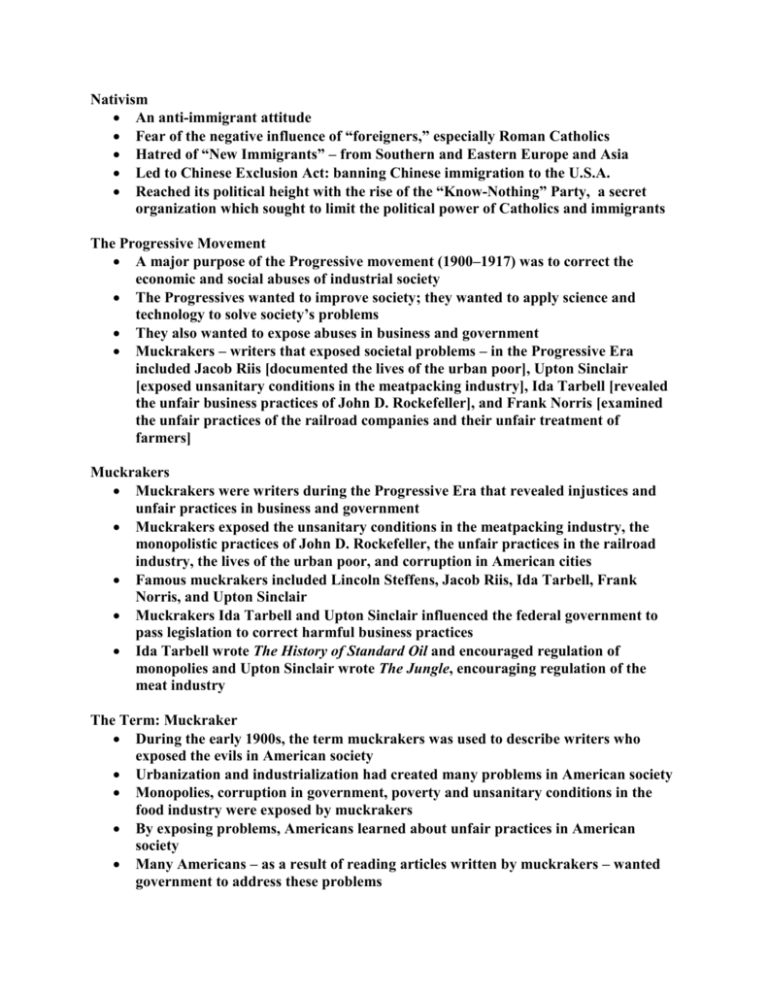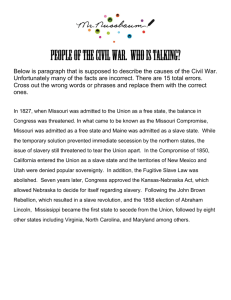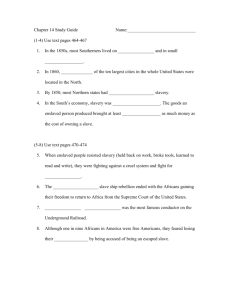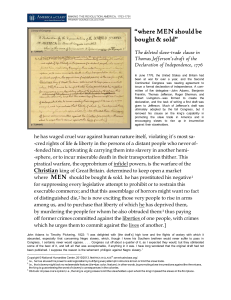Flashcards US 10 - White Plains Public Schools
advertisement

Nativism An anti-immigrant attitude Fear of the negative influence of “foreigners,” especially Roman Catholics Hatred of “New Immigrants” – from Southern and Eastern Europe and Asia Led to Chinese Exclusion Act: banning Chinese immigration to the U.S.A. Reached its political height with the rise of the “Know-Nothing” Party, a secret organization which sought to limit the political power of Catholics and immigrants The Progressive Movement A major purpose of the Progressive movement (1900–1917) was to correct the economic and social abuses of industrial society The Progressives wanted to improve society; they wanted to apply science and technology to solve society’s problems They also wanted to expose abuses in business and government Muckrakers – writers that exposed societal problems – in the Progressive Era included Jacob Riis [documented the lives of the urban poor], Upton Sinclair [exposed unsanitary conditions in the meatpacking industry], Ida Tarbell [revealed the unfair business practices of John D. Rockefeller], and Frank Norris [examined the unfair practices of the railroad companies and their unfair treatment of farmers] Muckrakers Muckrakers were writers during the Progressive Era that revealed injustices and unfair practices in business and government Muckrakers exposed the unsanitary conditions in the meatpacking industry, the monopolistic practices of John D. Rockefeller, the unfair practices in the railroad industry, the lives of the urban poor, and corruption in American cities Famous muckrakers included Lincoln Steffens, Jacob Riis, Ida Tarbell, Frank Norris, and Upton Sinclair Muckrakers Ida Tarbell and Upton Sinclair influenced the federal government to pass legislation to correct harmful business practices Ida Tarbell wrote The History of Standard Oil and encouraged regulation of monopolies and Upton Sinclair wrote The Jungle, encouraging regulation of the meat industry The Term: Muckraker During the early 1900s, the term muckrakers was used to describe writers who exposed the evils in American society Urbanization and industrialization had created many problems in American society Monopolies, corruption in government, poverty and unsanitary conditions in the food industry were exposed by muckrakers By exposing problems, Americans learned about unfair practices in American society Many Americans – as a result of reading articles written by muckrakers – wanted government to address these problems Seneca Falls Convention (1848) The first conference in world history for women’s rights Organized by Elizabeth Cady Stanton and Lucretia Mott Demanding equal rights for women and particularly the right to vote, the Seneca Falls Convention challenged patriarchy or male dominance A goal set at the Seneca Falls Convention (1848) was achieved during the Progressive Era by the ratification of the woman’s suffrage amendment Yes, during the Progressive Era, the Nineteenth Amendment was added to the U.S. Constitution granting women the right to vote or the right of suffrage The Sixteenth Amendment The Federal Income Tax Amendment The type of federal tax authorized by the 16th amendment in 1913 was the income tax Passed by Congress on July 2, 1909, and ratified February 3, 1913, the 16th amendment established Congress’s right to impose a Federal income tax Income tax allows for the federal government to keep an army, build roads and bridges, enforce laws and carry out other important duties The federal government realized in 1913 that in order for it to collect taxes effectively, and not have to share that tax money with the states, federal income tax was necessary Homestead Steel Strike and Pullman Railcar Strike In the late 1800s, the Homestead steel strike and the Pullman railcar strike were unsuccessful because the government supported business owners Workers went on strike [work stoppage or refusing to work] to demand higher wages and better working conditions But in this time period, the government supported Laissez-faire policies and favored business owners When workers went on strike, government support of business owners led to government troops being called in to stop the strikes Federal troops put down the strikes Dawes Act of 1887 Passage of the Dawes Act of 1887 affected Native American Indians by attempting to assimilate them into mainstream American culture To assimilate is to learn the culture of the dominant group Native American Indians were required to adopt the culture of white Americans – to cut their hair, learn English, and acquire private property as opposed to shared property Native American Indians were forced to abandon their cultural ways This policy greatly harmed Native American Indians The Populist Party Farmers generally supported the Populist Party For over a decade, farmers were suffering from crop failures and falling prices Many farmers were in debt due to a drought that affected the Midwest in the 1880s These disasters, combined with resentment against railroads, led farmers to organize The Populist Party wanted government ownership of the railroads, the direct election of Senators, banking reform, and free and unlimited coinage of silver Upton Sinclair Muckraker or writer exposing problems in society Wrote The Jungle Exposed the unsanitary conditions in the meatpacking industry In 1906, the publication of The Jungle, written by Upton Sinclair, led Congress to establish a system for meat inspection His writings led to government regulation of the food industry USS Maine and Yellow Journalism Yellow Journalism was a style of newspaper reporting that emphasized sensationalism over facts In Yellow Journalism, newspapers tried to shock or outrage readers with information that was not always completely factual Newspapers exaggerated the news When the USS Maine, a battleship, sank in Havana harbor, yellow journalists blamed Spain – even before the facts had been examined – thereby encouraging Americans to want to go to war with Spain The explosion of the USS Maine and the practice of yellow journalism played a significant role in the public’s support for the Spanish-American War Yellow Journalism and the Spanish-American War Yellow journalism contributed to the start of the Spanish-American War (1898) by inciting public outrage over conditions in Cuba Cuba was a colony of Spain Americans read in American newspapers about the cruelty of the Spaniards in their colony of Cuba These newspaper stories outraged Americans Of course, some of the “facts” in the newspapers were exaggerated to ensure that Americans would be outraged and thus, yellow journalism was one cause of the Spanish-American War Neutrality in World War I The United States tried to avoid involvement in World War I by following a policy of neutrality Neutrality is refusing to take sides in a conflict or have alliances The United States followed a policy of neutrality from its earliest days In his Farewell Address, George Washington encouraged a policy of neutrality He believed that a new nation could not be embroiled in Europe’s problems The Open Door Policy The Open Door Policy was a U.S. policy that promoted equal opportunity for international trade and commerce in China Important ports and parts of China had been controlled by Europeans – spheres of influence – during the Age of Imperialism The United States did not have a sphere of influence in China and therefore wanted to make sure that Americans could trade directly with China An Open Door Policy means that all foreigners can trade A primary reason for the establishment of the Open Door policy (1899) was to protect United States trade in the Far East [Far East is an ethnocentric term; it refers to China, Korea, and Japan] The Great Migration Many African Americans migrated from the South to the North during and following World War I The main reason for increased migration of African Americans out of the rural South during and following World War I was the opportunity for factory jobs in the North Another reason was to escape Jim Crow segregation in the South Another reason was to escape sharecropping In the North, more freedoms and opportunities existed The Federal Reserve System To improve distribution of money and guarantee an adequate money supply, President Woodrow Wilson asked Congress to establish the Federal Reserve System The Federal Reserve System is the nation’s central banking system The Federal Reserve System – often called “The Fed” – is a bank for other banks and a bank for the federal government It was created to provide the nation with a safer, more flexible, and more stable monetary and financial system A mother bank makes sure that the nation’s banking practices are fair and safe – it was formed to protect its member banks from suffering the consequences of bank runs (which occur when a bank’s customers try to withdraw their money all at once because they’re afraid the bank is, or might become, insolvent and unable to pay off their customers) Schenck v. United States Supreme Court Case involving an action taken during World War I About freedom of speech during wartime Court ruled that during wartime, freedoms can be restricted or limited The clear-and-present danger doctrine established in Schenck v. United States (1919) permits the government to limit speech that threatens the security of the nation In reviewing the conviction of a man charged with distributing antiwar flyers to draftees of World War I, the Court asserted that, in certain contexts, words can create a “clear and present danger” that Congress may constitutionally prohibit Temperance Movement Anti-alcohol movement The primary goal of the Temperance Movement was the ratification of a constitutional amendment authorizing Prohibition Prohibition referred to the banning of alcohol or making alcohol illegal Temperance activists believed that alcohol caused many problems in society Temperance activists believed that by outlawing alcohol, families and society would improve Henry Ford’s Assembly Line Henry Ford’s use of the assembly line in the production of automobiles led directly to a decrease in the cost of automobiles An assembly line is a faster and more efficient way of manufacturing a good Henry Ford was the first to pioneer the assembly line in automobile production By making cars faster, more cars were produced Increased production leads to a decrease in price Robber Baron An insulting term for a monopolist In the late 1800s, the term robber baron was used to describe some owners of big businesses primarily because they eliminated competition using ruthless methods A robber baron used unfair practices to eliminate competition and dominate a market A monopolist is a single seller dominating a market A robber baron was a monopolist who dominated the market through unfair practices Why the United States Did Not Join the League of Nations The League of Nations was an international peacekeeping organization formed after the First World War Although President Woodrow Wilson favored the Treaty of Versailles and the United States’ participation in the League of Nations, the Senate rejected the treaty Senators feared that by participating in an international peacekeeping organization, the United States would be drawn into another European conflict Thus, the U.S. did not join the League of Nations The Senate’s opposition to United States membership in the League of Nations was based mainly on the fear of being drawn into future wars The American Federation of Labor (AFL) An early and still existing union Organization of workers that promotes higher wages and better working conditions Early leader was Samuel Gompers Organized only skilled workers One reason the American Federation of Labor (AFL) was successful was that this organization focused on the needs of skilled workers Rapid Industrial Growth and Urbanization Industrial growth means more factories and more factory jobs Urbanization is movement to cities When industrial growth occurs, more people move to cities In cities are located factories and jobs and thus, people move to cities in order to find employment in factories As such, in the late 1800s, rapid industrial development resulted in an increase in the rate of urbanization Tariff A tariff is a tax on imported or foreign goods A tariff raises the prices of foreign goods A tariff encourages the consumption of domestic goods or goods made in the country as domestic goods have lower prices compared to foreign goods A high protective tariff passed by Congress is intended to affect the United States economy by encouraging American manufacturing Tariffs encourage Americans to buy American goods Sherman Antitrust Act In passing the Sherman Antitrust Act (1890), Congress intended to prevent large corporations from eliminating their competition Antitrust laws are anti-monopoly laws A monopoly eliminates competition thereby creating a market with a single seller A single seller dominating a market leads to higher prices for consumers Antitrust laws allow the government to regulate business practices and ensure that harmful monopolies are not created Eight Hours for Work Organizers of labor unions often used the slogan: “Eight hours for work, eight hours for rest, eight hours for what we will!” This slogan addressed the long hours workers often worked Factory workers could work fourteen to sixteen hours a day To create better working conditions, organizers of labor unions advocated an eighthour work day “We want to feel the sunshine, and we want to smell the flowers, We are sure that God has will’d it, and we mean to have eight hours.” Social Darwinism The idea that society advances when its fittest members are allowed to assert themselves with the least hindrance Social Darwinism was a popular belief among the upper classes and monopolists It stated that the rich and powerful were rich and powerful because they were genetically destined to rise to the top in society It was the belief that the poor were poor because they were not the fittest members of society This belief stated that the strong dominate the weak because it is as nature intended – the survival of the fittest The U.S. Government and the Railroads To aid the construction of the railroads, the U.S. government gave free land or land grants to railroad companies Building a railroad is expensive and profits are not immediately earned; therefore to encourage construction, government land grants were incentives or rewards to private railroad companies – incentives to build In the period from 1865 to 1900, the United States Government aided the development of the West by granting land to railroad companies A transcontinental railroad was important for Americans in that it encouraged westward expansion and increased trade By giving free land to private railroad companies, railroads were built that benefitted Americans Laissez-faire Capitalism The government does not intervene in the market Literally means: “Let them [businesses] do as they please” A totally free market In laissez-faire capitalism, prices and wages are determined by the marketplace If many consumers demand a product, the price of the product will be higher than if demand for a product is low The Solid South The label “Solid South” was applied to the former Confederate States after Reconstruction because they consistently supported the Democratic Party It is important to remember that Abraham Lincoln was a Republican and that the Civil War started when South Carolina seceded from the Union after the election of Lincoln White Southerners feared that the Republican Party would abolish slavery Even after the Civil War and the abolition of slavery with the Thirteenth Amendment, white Southerners harbored anger towards the Republican Party White Southerners voted consistently for the Democratic Party because it blamed the Republicans for the Civil War and Reconstruction The Fugitive Slave Act Part of the Compromise of 1850 The Fugitive Slave Act required Northerners to return runaway slaves to their masters in the South As a result of the Fugitive Slave Act, no runaway slave was safe in the North In the 1850s, runaway slaves went to Canada because the Fugitive Slave Act kept them at risk in the United States The Underground Railroad ended in Canada to ensure that no runaway slave would be returned to his master Jim Crow Laws Jim Crow laws were segregation laws in the South after the Reconstruction Era Although important strides were made, Reconstruction failed to provide lasting guarantees of the civil rights of the freedmen due to the passage of Jim Crow laws in the 19th century Reconstruction – or the period after the Civil War when the South was restructured to allow for the changes created by the 13th [abolition of slavery], 14th [equal rights of citizens], and 15th [right to vote for all male citizens] amendments – produced some changes in the South but after military Reconstruction ended, some earlier unjust ways were restored in the South Jim Crow or segregation laws discriminated against African Americans Separate public facilities denied African Americans of their equal rights Booker T. Washington Born into slavery, Booker T. Washington rose in American society and advocated ways in which to improve the lives of African Americans after the Civil War He wrote an autobiography titled “Up from Slavery” He was the founder of the Tuskegee Institute to provide vocational training for African Americans He believed that the most immediate means for African Americans to achieve equality was to expand their opportunities for vocational education Through job training and skilled employment, African Americans would earn wealth and through wealth, respect and equality would come Abraham Lincoln’s Argument against Secession Abraham Lincoln believed that the government was a union of people and not of states The Preamble to the Constitution states, “We the People…” Lincoln believed that states could not secede or withdraw from the Union The Union was a union of the people not the states Therefore, secession could not occur simply because a state claimed the right to withdraw from the union Literacy Test Used in the South to prevent African Americans from voting Literacy tests were unfair and unduly hard “[The registrar] brought a big old book out there, and he gave me the sixteenth section of the constitution of Mississippi, . . . I could copy it like it was in the book, but after I got through copying it, he told me to give a reasonable interpretation and tell the meaning of the section I had copied. Well, I flunked out.” A literacy test was particularly unfair because generally only African American males were required to take the test [whites were exempt and women could not vote until the Nineteenth Amendment] Former slaves were often illiterate because of discrimination and economic hardship which prevented education Plessy v. Ferguson (1896) Supreme Court case The Jim Crow laws, upheld by the Supreme Court in Plessy v. Ferguson (1896), provided for separate public facilities based on race In the ruling, the Court stated that separate facilities were constitutional as long as the facilities were equal “Separate but equal” Of course, the facilities were not equal and this unjust decision was not overturned until Brown v. the Board of Education in the 1950s The Impeachment of Andrew Johnson To impeach is to charge a federal official with a crime President Andrew Johnson was impeached but not found guilty His crime really wasn’t crime rather he did not agree with the Radical Republicans in Congress and their plans for Reconstruction Johnson, like Lincoln, favored a lenient plan for Reconstruction; Radical Republicans wanted to punish Confederates for the Civil War and restructure the American South with full equality for African Americans The underlying reason for the impeachment of President Andrew Johnson was a power struggle with Congress over Reconstruction Sharecropping Sharecropping is a system where a farmer is a tenant on another man’s land The sharecropping essentially rents the land to farm and pays the high rent in crops grown Sharecroppers were often in debt as the rents were too high and had to borrow money from the owners to stay on the land and feed their families Sharecropping came into existence after the Civil War and the abolition of slavery with the 13th Amendment The effect of the system of sharecropping on the South after the Civil War was that it kept formerly enslaved persons economically dependent The Extension of Slavery The extension of slavery led to conflict between slave states and free states Fearing that the admission of a new state as a slave state or a free state could affect the balance of power in Congress thereby giving either slave states or free states more power in Congress, the extension of slavery led to compromises to prevent fullscale conflict between the free states and the slave states Headlines like “Compromise Enables Maine and Missouri To Enter Union” (1820), “California Admitted to Union as Free State” (1850), and “Kansas-Nebraska Act Sets Up Popular Sovereignty” (1854) reflect the compromises that occurred as a result of the extension of slavery in the United States The Missouri Compromise tried to keep the balance between free and slave states The Compromise of 1850 allowed California to enter as a free state but led to the enactment of the Fugitive Slave Act In the Kansas-Nebraska Act, the citizens of the new state voted to determine if the state would be slave or free; this was popular sovereignty or letting the people decide Slavery in the South Before the Civil War, slavery expanded in the South rather than in the North because geographic conditions in the South encouraged the development of large plantations The South had fertile land and a long growing season Crops like tobacco and cotton grew in the South Large farms or plantations developed in the South due to favorable geographic conditions Plantations depended on slave labor President Lincoln’s Fair and Generous Peace Abraham Lincoln’s goal for Reconstruction – the period after the Civil War – was a fair and generous peace He wanted to heal the nation’s wounds from the Civil War and reunite the nation quickly In his inaugural speech, he said, “With malice toward none, with charity for all, with firmness in the right as God gives us to see the right…” With malice towards none means with no hatred He wanted to forgive and quickly restore the Union – the Radical Republicans had a different vision for Reconstruction The Census Every ten years, the population of each state is recorded in the census Population is recorded to determine the number of representatives each state will receive in the House of Representatives and also determines the number of electors each state will receive in the electoral college as this is determined by the number of each state’s representatives in the House and two senators Thus, population data from the census of 2000 was used to determine the number of electoral college votes from each state The census is very important; it recognizes that a state’s population may increase or decrease over a period of time Thus, the number of electoral college votes and representatives in the House of Representatives that a state has may change every ten years The Great Plains The Great Plains are flat lands between the Mississippi River and the Rocky Mountains The Great Plains was added to the United States as a result of the Louisiana Purchase The Great Plains are good for farming and herding The Great Plains has been called the “breadbasket” of the nation Grain crops like wheat and corn are grown in the Great Plains Judicial Review Established in the Supreme Court case of Marbury v. Madison It is the power of the Supreme Court to determine if a law is constitutional or unconstitutional Thus, the Supreme Court has the power to interpret the Constitution The Supreme Court has the power to determine what the founding fathers meant when they wrote the Constitution This power of judicial review has strengthened the power of the federal government as only the Supreme Court can declare a law unconstitutional Federalism The American system of government Governmental power in the United States is divided between the Federal government and the state governments Federalism is best defined as a principle of government that divides power between the central government and state governments The Federal government has certain powers like the power the declare war or coin money The state governments have other powers like issuing driver licenses or High School diplomas yet both the Federal and state governments can levy taxes The Great Compromise When the Constitution was being discussed and written, there was a debate between the big states and the small states States with lots of people wanted more representatives in Congress but small states feared that they would have no voice in the Federal government if representation was based on population So, a compromise was reached known as the Great Compromise or the Connecticut Compromise The Great Compromise reached at the Constitutional Convention resulted in the creation of a bicameral legislature A bicameral legislature means that Congress has two houses or parts: the House of Representatives based on each state’s population [thus, more people in the state, more representatives for that state in the House] yet an equal number of representatives for each state in the Senate [two senators per state] The “New Immigrants” From Southern and Eastern Europe Arrived in the late 1800s and early 1900s Primarily to work in factories in cities Generally did not speak English and might be Catholics or Jews – culturally different from “Old Immigrants” who were English-speakers and mostly Protestant, excluding the Irish who were Catholics Faced discrimination by nativists or people with anti-immigrant attitudes Triangle Shirtwaist Company fire of 1911 The tragedy of the Triangle Shirtwaist Company fire of 1911 drew national attention to the need to protect the safety of workers In this terrible fire, many female garment workers died as the doors to the factory were locked shut – keeping the women in the factory even when a fire erupted Many women died from the fire or from jumping to their deaths The tragedy shed light on the poor working conditions in factories and the mistreatment of workers As a result of the fire, new government regulation occurred that improved working conditions in many factories throughout the nation John D. Rockefeller Monopolist Accused of being a robber baron or a monopolist who used unfair business practices to create a monopoly Written about by Ida Tarbell in her muckraking book, The History of the Standard Oil Company Believed in Social Darwinism or that the fittest are the wealthiest and most successful Once said, “The American beauty rose can be produced in all its splendor only by sacrificing the early buds that grow up around it.” - or that the great business only exists by sacrificing its inferior competitors Government Regulation of Monopolies The Sherman Antitrust Act To prevent monopolistic activities To ensure fairness in the market and competition Competition is good for consumers – lower prices of products and better quality products The Sherman Antitrust Act was the first Federal act that outlawed monopolistic business practices




